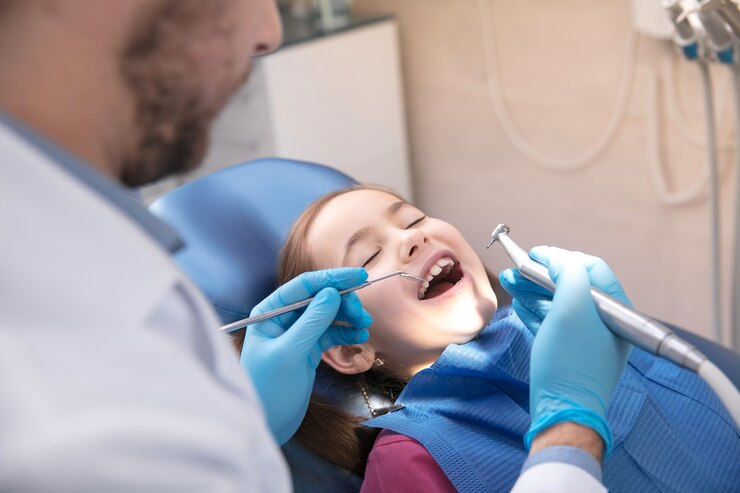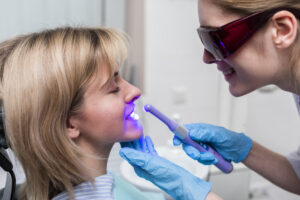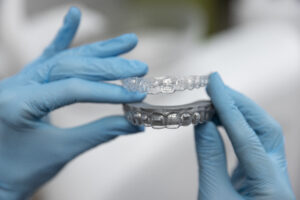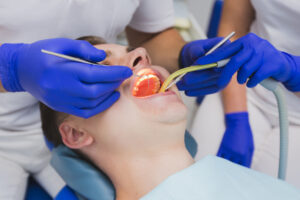Children’s Dentistry focuses on the oral health of infants, children, and adolescents. Pediatric dental specialists do much more than fill cavities—they support your child’s overall growth and well‑being from the very start.
Understanding Growth and Mouth Development
From birth through adolescence, a child’s jaw and teeth are changing rapidly. A pediatric dentist tracks emerging baby teeth, monitors the spacing and eruption of adult teeth, and can spot potential bite or alignment issues early on. Early observation helps prevent orthodontic problems before they become severe.
This early care also plays a role in proper speech development. Misaligned teeth or tongue placement issues can affect pronunciation. Dentists trained in children’s oral health can identify these concerns and collaborate with speech therapists if needed, which supports clear speech and communication later.
Preventing Oral Disease from the Start
Decay in baby teeth— especially early childhood caries— is remarkably common but largely preventable. This condition affects children before age six and often results from frequent sugar exposure, bacterial transmission from caregivers, or poor hygiene habits.
Pediatric specialists emphasize prevention: they examine diet habits, help parents establish brushing routines using child-size brushes and small amounts of fluoride toothpaste, and apply sealants or varnish when appropriate. They also teach parents how to clean their child’s gums even before the first tooth appears, reducing bacterial buildup early on.
Regular visits beginning by the time the first tooth appears—or by the first birthday at latest—help detect problems early. Studies show children who begin preventive visits early face fewer dental issues and lower overall treatment costs.
Key Functions of Pediatric Dentists and How They Help Your Child
Pediatric dental professionals carry out a range of responsibilities that shape your child’s oral health, habits, and confidence.
Developing Healthy Habits Through Routine and Education
Young children learn by watching and by forming routines. Pediatric dentists coach both child and parent on daily brushing and flossing episodes using guidance appropriate for age and dexterity. They use techniques like “tell‑show‑do,” demonstrating tools and procedures in friendly, low‑pressure ways before doing them. This approach lowers dental anxiety and helps children feel more comfortable in the dentist’s chair.
Dentists also speak with parents about nutrition: roles of sugar‑limiting, timing of sweet snacks, benefits of calcium‑rich foods, and how diet affects tooth strength and oral bacteria.
Screening, Diagnosis, and Treatment
During visits, parts of the role include:
- Check‑ups and cleaning: Regular examination of teeth, gums, bite alignment, and oral tissues. Cleaning helps prevent plaque buildup and decay.
- Risk assessment: Evaluating diet, brushing habits, and potential decay risk to develop a care plan.
- Preventive treatments: Application of fluoride varnish or dental sealants to protect molars and other vulnerable surfaces.
- Restorative care: Using techniques like atraumatic restorative treatment (ART) or stainless steel crowns applied with Hathe ll technique for decayed baby teeth. These methods are less invasive, quicker, and more comfortable for young children.
- Emergency and special needs care: Handling dental trauma, infections, extractions, and managing treatment under sedation or anesthesia if needed, especially for children with medical or behavioral needs.
Building Emotional Comfort and Confidence
Fear of the dentist can begin early. Pediatric dental professionals know how to help children feel secure. Techniques include modelling (letting kids see another child undergo a gentle exam first), using distraction tools, and telling the child what to expect before performing a task.
Evidence shows children treated by specialists often have lower anxiety levels and better cooperation. Over time, these positive early experiences help foster lifelong confidence in visiting the dentist.
How This Supports Your Child’s Overall Development
A healthy mouth supports more than just clean teeth:
- Nutrition and growth: A well‑functioning mouth enables chewing a variety of foods, which supports balanced nutrition and healthy development.
- Clear speech: Properly aligned and functioning teeth and jaws contribute to correct sound formation and speech fluency.
- Self‑esteem and social comfort: A confident smile reduces social anxiety and encourages positive interaction with peers.
- Reducing future risks: Well‑maintained oral health reduces the likelihood of infections or complications that can affect general health.
Supporting Your Child: Tips for Parents
Here are some simple steps to help your child benefit from children’s dentistry:
- Start early: Schedule the first visit once the first tooth appears or before the first birthday. Continuing regular check‑ups (about every six months) builds continuity.
- Practice at home: Use age‑appropriate brushing, teach flossing early, supervise until they’re around age six, and introduce fluoride toothpaste as advised.
- Limit sugary foods and drinks: Be mindful of snacking and bedtime bottles or sippy cups with juice or milk—reduce sugar exposure at night.
- Communicate and reassure: Prepare your child by talking about the dentist positively. Try pretend check‑ups with a stuffed toy to build familiarity.
- Choose the right dentist: Look for a pediatric professional who works with young ones, uses gentle behavior support, and makes visits fun and predictable.
Nurturing Healthy Habits from the First Tooth
Children’s Dentistry plays an essential role in shaping a child’s healthy smile, proper growth, verbal skills, and emotional well‑being. Early visits, consistent routine, preventive treatments, and child‑friendly care help protect oral health and support broader development. By understanding the functions of a pediatric dental specialist, parents can make informed decisions that build a solid foundation for their child’s future.
Investing in children’s oral care today pays off in lifelong benefits—nurturing confident smiles, reducing fear, and ensuring healthy habits that last well into adulthood. Let pediatric dental care be part of your child’s development journey from the very beginning.





